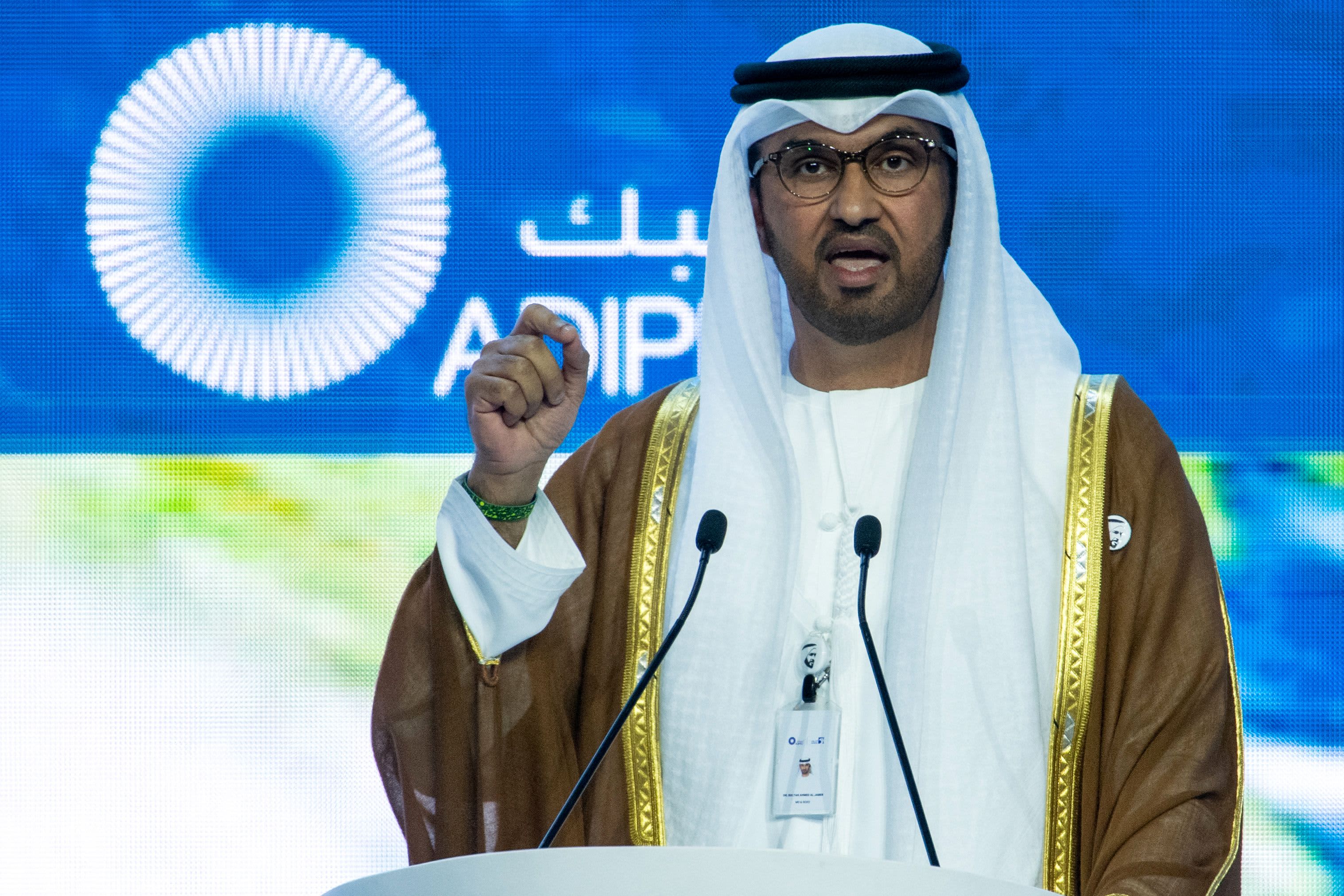
The United Arab Emirates planned to use its role as the host of the biggest and most important annual climate conference as a platform to lobby foreign government officials for oil and gas deals, according to a cache of internal documents obtained by a not-for-profit investigative journalism organization.
The leaked records show that Sultan al-Jaber, who controversially serves as both COP28 president-designate and chief executive of state oil giant ADNOC (the Abu Dhabi National Oil Co.), planned to discuss fossil fuel deals with 15 countries during the forthcoming climate conference. Al-Jaber was the founding CEO of Abu Dhabi state-owned renewable energy firm Masdar.
The documents were published Monday by the Centre for Climate Reporting, which worked in collaboration with the BBC. CCR, which has received funding from the likes of Greenpeace and Rockefeller Philanthropy Advisors, said it was able to verify the accuracy of the leaked documents via an unnamed whistleblower.
“The documents referred to in the BBC article are inaccurate and were not used by COP28 in meetings. It is extremely disappointing to see the BBC use unverified documents in their reporting,” a COP28 spokesperson said.
A spokesperson for ADNOC was not immediately available for comment when contacted by CNBC. Masdar declined to comment.
The documents purportedly show briefing notes prepared by the UAE’s COP28 team for meetings with almost 30 foreign governments ahead of the summit, which starts Thursday and is scheduled to run through to Dec. 12.
Among some of the proposed talking points for al-Jaber were the UAE’s hope to get off the Brazilian “tax haven” list to help facilitate new investments from Masdar, its desire to consider a possible deal with China over liquified natural gas projects and its position that ADNOC “stands ready to support the supply of petrochemicals to Egypt.”
COP28 is the United Nations’ upcoming round of global climate talks. The two-week-long summit will be held in Dubai, with scores of world leaders and government ministers from nearly 200 countries expected to attend — alongside an estimated 70,000 delegates.
It is regarded as a pivotal opportunity to accelerate action to address the climate crisis at a time when global temperatures are hitting record highs and extreme weather events are affecting people worldwide.
The United Nations Framework Convention on Climate Change did not immediately respond to a CNBC request for comment on the leaked documents. The Conference of the Parties (COP) is the supreme decision-making body of the UNFCCC.
‘A fox is guarding the hen house’
Human rights group Amnesty International repeated its call for al-Jaber to stand down from his role at ADNOC to ensure the success of the COP28 summit.
“Sultan Al Jaber claims his inside knowledge of the fossil fuel industry qualifies him to lead a crucial climate summit but it looks ever more like a fox is guarding the hen house,” Amnesty International’s climate advisor, Ann Harrison, said in reaction to the leaked documents.
“Our calls on Sultan Al Jaber to step down from his role at ADNOC if he wishes to lead a successful summit remain valid,” Harrison said.
“Documents suggesting he was briefed to advance business interests in COP meetings only fuel our concerns that COP28 has been comprehensively captured by the fossil fuel lobby to serve its vested interests that put the whole of humanity at risk.”
In a statement confirming his appointment as COP28 boss at the start of the year, al-Jaber said, “The UAE is approaching COP28 with a strong sense of responsibility and the highest possible level of ambition.”
“Pragmatism and constructive dialogue must be at the forefront of our progress,” he added.
Al-Jaber’s office said at the time that the minister had played a “proactive participatory role” at more than 10 COP summits and brings to his role two decades of business and leadership experience in government, climate policy, and across the renewable and energy sectors.
ADNOC, which recently became the first among its peers to bring forward its net-zero ambition to 2045, said in January of this year that it would allocate $15 billion for investment in “low-carbon solutions” by 2030, including investments in clean power, carbon capture and storage, and electrification projects.
Masdar, meanwhile, works in more than 40 countries worldwide and has invested in or committed to invest in renewable energy projects with a total value of over $30 billion.
Source: CNBC
